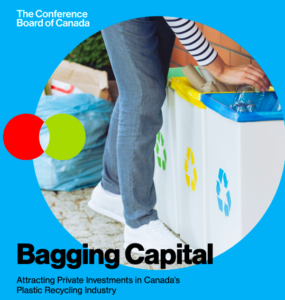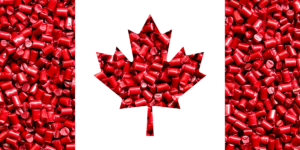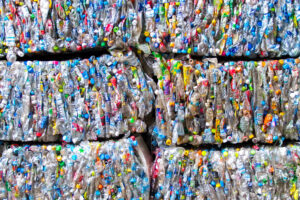- Plastics Marketplace
- National
Grain bag recycling in Western Canada
Plastic grain bags are becoming increasingly important to farmers throughout western Canada; however, disposal of the bags has always been a problem. Many landfills do not accept grain bags, and Cleanfarms now offers recycling services.
Full Article:
Author: Braden Hursh, Grain News
Large plastic grain bags are continuing to grow in popularity across Western Canada. They are convenient, easy to use and can store massive amounts of grain. Many farmers are converting exclusively to using grain bags instead of bins. But as the bags are emptied as grain is moved throughout the winter and spring, the question for many farmers is: what do you do with the bags once they are emptied?
Current grain bags are not reusable year after year and need to be dealt with once they are empty. In the past, these bags were very difficult to dispose of as many landfills did not accept them due to their size. Despite being illegal and having many health and environmental risks, a lot of farmers would resort to burning or burying the plastic bags once they were emptied.
Saskatchewan, the largest user of grain bags in Canada, now has a program called Cleanfarms, a not-for-profit grain bag recycling organization that is federally regulated. Barry Friesen, general manager of Cleanfarms, says that “There are currently 25 rural municipalities (RMs) that offer grain bag drop off services, and we are looking to expand that to 35 sites.”
One of the main goals of the program is for drop-off points to be accessible to all farmers in the province. Friesen says that once the program is in full swing, “No farmer should have to drive more than 50 to 75 km to drop their grain bags off.” Cleanfarms has set its goal at recovering 75 per cent of all grain bags used in the province.
In Saskatchewan there will be no fee to have grain bags recycled at the drop-off point. But as of November 1, 2018, 25 cents per kilogram will be charged on all grain bags purchased in Saskatchewan to cover the recycling and processing fee. This would work out to roughly $40 added onto the price of a 250-foot bag.
Manitoba has been running a pilot program since 2013 with the intention of having a full agricultural plastics recycling program in place by 2020. The Manitoba program will be able to accept bale and silage wraps, twine and grain bags.
There are no federal programs currently in place in Alberta, but organizations such as The Alberta Plastics Recycling Association help to facilitate recycling opportunities between people or organizations with potential recyclers. Tammy Schwass, executive director of Alberta Plastics Recycling Association, says that, “There are currently 15 stakeholders across the province representing crops, livestock, dairy, municipalities, processors, and non-profits. There are also six municipalities that have recycling programs of their own.”
The government is currently participating with the working group in Alberta but have not yet committed to a program.
Recycling grain bags
Before processing, the grain bags must be cleaned and rolled. Excess grain is asked to be removed, as well as any major dirt or grime. Recyclers realize that no bag will be perfectly clean, but if the bag is cleaner there will be less processing and it will yield a higher quality of recycled plastic.
Although some of the newer grain bags have their own rolling mechanism, there are a variety of other options. Many drop-off locations will offer onsite rolling or they will have a roller that can be taken directly to farms. There are also grain bag rollers that are available to purchase that can be mounted and transported to wherever the empty grain bags are located.
Grain bags are processed and turned into small pellets which can be converted into new plastic products. Many of the agricultural plastics are shipped overseas to be processed as there are very few recycling plants in Canada, but as the use of grain bags continues to expand, there are many that hope there can be more processing facilities in Canada.



